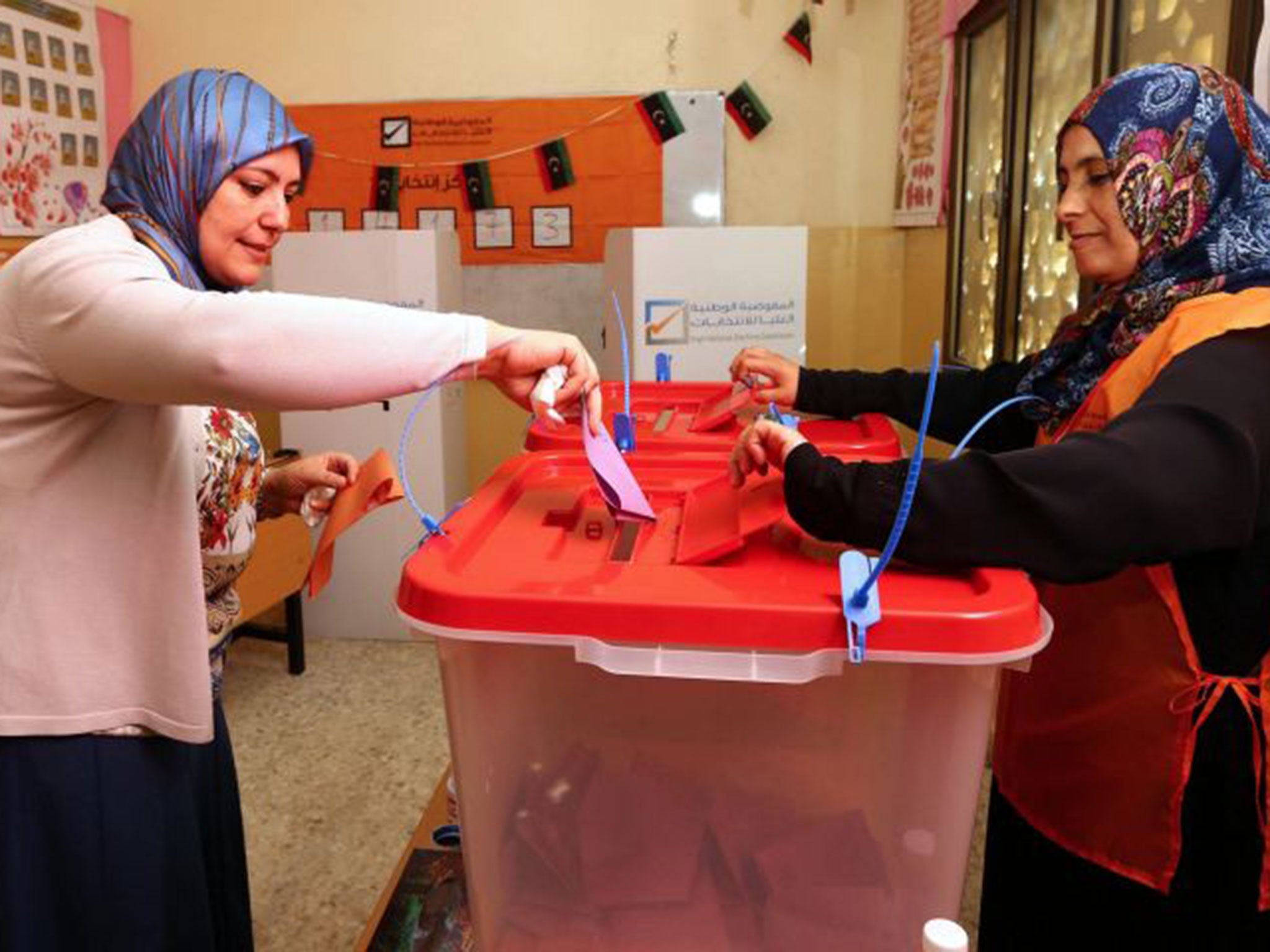Libya elections: Libyans cling to hopes of democracy in polls to elect fresh parliament
Despite the bombing of an Islamist arms depot in Benghazi, most of the day passed off peacefully

Your support helps us to tell the story
From reproductive rights to climate change to Big Tech, The Independent is on the ground when the story is developing. Whether it's investigating the financials of Elon Musk's pro-Trump PAC or producing our latest documentary, 'The A Word', which shines a light on the American women fighting for reproductive rights, we know how important it is to parse out the facts from the messaging.
At such a critical moment in US history, we need reporters on the ground. Your donation allows us to keep sending journalists to speak to both sides of the story.
The Independent is trusted by Americans across the entire political spectrum. And unlike many other quality news outlets, we choose not to lock Americans out of our reporting and analysis with paywalls. We believe quality journalism should be available to everyone, paid for by those who can afford it.
Your support makes all the difference.The turnout was low, as were expectations of a rapid end to the turmoil, but a steady stream of Libyans voted to stamp their belief in democratic change as the only way to steer their country back to the right path.
The message from many was that the alternative to the ballot box was too terrible to contemplate. Abdul Rays, 64, who had returned from London with his family, described his fears for the “Syrianisation of our country which we cannot allow to happen”.
He stressed: “We are not running back to Britain. We left during Gaddafi's time, as did so many others. An opposition was gone, and that let the dictator stay on in power for so long. We don't want to go again this time and leave the field open to the Islamists.”
Some had personal reasons not to abandon hope. Mr Rays' 22-year-old nephew, Malik, a revolutionary fighter, was shot during the final days of fighting in Tripoli. “He's now paralysed, from neck down, receiving treatment in Italy. How can we just give up when people have sacrificed so much [for us to] have this right to vote?” he asked.
Hundreds had been killed in the fighting since the fall of the regime. An army commander, Major General Khalifa Haftar, is waging an attritional campaign against jihadist groups who he claims are being funded by countries behind the most extreme rebel groups in Syria. He blames Qatar especially.
Most of the day passed off peacefully, until early evening when war planes in General Haftar's forces destroyed an arms depot belonging to an Islamist militia in the Tika district of Benghazi, a city which has seen repeated fighting.
But Tripoli remained calm. Outside the Salheddine Al Ayoubi school, one of the voting centres, Halima Jabbouri, who had come with her three daughters, said: “We were unsure if there was going to be trouble and we waited, but it is all peaceful. I can understand some people are fed up with the politicians, but this is a chance to vote out the ones we don't like.”
There was no voting, however, in the eastern city of Darna, which has a strong Islamist presence and has been, through the years, a jumping-off point for jihadists - to Iraq during the US-led occupation, and now to Syria and Iraq. Head teachers in the city rejected a request from the Higher National Elections Commission to let 17 of their schools be used as polling centres. They pointed out that five schools had been bombed after they were designated for voting before elections to the Constitutional Drafting Committee in February.
Today's voting is to elect a new parliament which will draw up a fresh constitution, something the ruling General National council has failed to do. Results are expected within a week and counting is generally expected to be fair. One of the best-turned-out stations was the Saida Zeina Al-Koubra school at Abu Salim, a district where many residents were Gaddafi loyalists. Fierce clashes had taken place when the capital fell to the rebels three years ago. Now the children's drawings on the walls depict the former “Brother Leader” being decapitated and the boot of a revolutionary crushing his cohorts.
Abdulbasset Rahoma, a teacher acting as an election official, was not surprised that voter registration was low, under 1.5 million. By contrast 2.8 million had registered for elections in July 2012, the first after the overthrow of the regime. “There was a lot of hope then... we saw the Muslim Brotherhood take it over. The Brotherhood has been trying to damage the election, asking people not to vote. We have had to counter that by saying: 'If you want change, you must vote.'”
The Airport Road camp shelters refugees from Tawergha, a community driven from their city by fighters from next door Misrata, who had accused them of collaborating with the regime during the revolution.
“Our dream is to go back one day. Whether this will help, I don't know,” said Faraj Milad, 69. “I want to die at home, not here, not at this place.”
Join our commenting forum
Join thought-provoking conversations, follow other Independent readers and see their replies
Comments